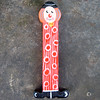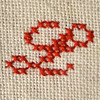- Go back to your thoughts/ideas about Library 2.0. Has anything changed as a result of this experience?
- I definitely learned that there is a lot out there. I also learned that just because something is an effective tool, doesn't mean that it is an effective tool for me. Just like in the non-digital world, a critical skill is going to be incorporating what works and eliminating what doesn't. The key in the digital world is going to be clearly defining the term "works". For me works is going to mean making me a more effective husband, father, teacher and contributor. Anything that doesn't help me with this, either by allowing me to have more time, be more efficient or be more effective is not a working tool for me.
- What were your favorite Things and discoveries?
- How did you connect with others doing the 23 Things On a Stick?
- Were there any take-a-ways or unexpected outcomes from this program that surprised you?
- I'm still anxious to connect more with others about their learning. If I've learned one thing more than anything else, it's that seeing how others are using the tools is far more effective than trying to figure it out by yourself. This is an important though with regards to education. Kids need to be shown how to incorporate tools into what they are already doing to be more effective, just like we do as teachers. I'm anxious to see what others took from the different tools and learn more from them!
- How would you describe your learning experience in one word or in one sentence, so we could use your words to promote 23 Things On a Stick learning activities to others?
- Things are not as scary or overwhelming as they seem once you commit to taking some time to explore them!
Monday, June 15, 2009
Thing 23: Reflection
Here are some questions to prompt you:
Thing 22: Keeping Up
My plan this summer (and beyond) for keeping up and keeping fresh is to stay in touch specifically with the development of productivity tools. My plan for doing this is to keep up with a few RSS feeds that I have found to be useful. Specifically:
I'm hoping to also explore, and, and ELIMINATE sites and tools that are not increasing productivity. My biggest concern is being stretched too thin with the number of sites and the time available. Finding a few tools that help me the most, and a few that will help kids the most is my goal.
I'd welcome any direction or help from all of you!
I'm hoping to also explore, and, and ELIMINATE sites and tools that are not increasing productivity. My biggest concern is being stretched too thin with the number of sites and the time available. Finding a few tools that help me the most, and a few that will help kids the most is my goal.
I'd welcome any direction or help from all of you!
Thing 21: Other Social Networks
The Myspace community is a massive one as well. My wife has had some luck using this site, as being a musician it allows her to share (and plug) her music. MySpace has even gotten her a few gigs and CD sales. I can understand why that site would have appeal for musicians.

I, however, not having a musical bone in me, have really only found use for one other social networking site. That site is called LinkedIn. It is a networking site for professionals, allowing for collaboration, PR, and subtle advertising that can lead insudtry professionals form every walk to connect with each for new business.
I could see some opportunities her for educators to connect with the business world or elsewhere to further involve the community with the schools.

I, however, not having a musical bone in me, have really only found use for one other social networking site. That site is called LinkedIn. It is a networking site for professionals, allowing for collaboration, PR, and subtle advertising that can lead insudtry professionals form every walk to connect with each for new business.
I could see some opportunities her for educators to connect with the business world or elsewhere to further involve the community with the schools.
Thing 20: Facebook

Facebook. Where do I begin on this one? I think I may have to just do a pros/cons list, as my editorial may not fit the criteria necessary for an academic blog post.
Pros:
- Definitely deserves the "fastest growing social network" title
- Allows for connection and reconnection of ANYONE from your life
- Groups for any topic known to humans
- Connections to people worldwide
- Connections between cultures and languages
- Social and Political opportunities
- Allows connection and reconnection of ANYONE from your life
- There are pictures of me everywhere, none of which I took or posted
- If I wasn't friends with you in high school, why would I want to be Facebook friends with you now?
- Most of my Facebook friends are not my human interaction friends
- Why do I care if you are "tired after a long day at work". The "What Are You Doing Now?" feature is beyond my ability to understand.
Facebook is here, it is powerful, and it is like poking myself in the eye with a sharp object.
From an educational standpoint, I'm hoping to further develop my class .tv site to provide similar social networking features for my students, to help them learn how to safely navigate such a site as Facebook.
Thing 19: Podcasting

I'm so impressed by the simplicity of GabCast. This year kids were able to create their own podcasts over the phone using this site. I know that there are infinite possibilities on how to use Podcasting in the classroom more effectively, but we started by doing book reviews. Here is a link to our classroom podcasts. Included is an intro to podcasting and then 3-4 groups of kids who did book reviews this year.
Room 8 Podcasts
I'm interested to see what other options are available and accessible for students using podcasting. I'm also interested in taking the next steps with regards to students expressing what they have learned using Podcasts.
Thing 18: YouTube

I've had both highs and lows using Youtube, and I think I could probably make a strong case for why it should be allowed and why it should be blocked. It definitely contains a boatload of great content, and an equal amount of trash. The question isn't whether YouTube should exist, it's how should it be accessed by kids, especially in a school environment. I personally think that blocking Youtube would eliminate the opportunity to teach kids hwo to use it appropriately and become responsible digital citizens. As educators, we can ignore Youtube, but how wlel are we then equipping kids for the worked the live in? YouTube is not going away, so let's tap into it.
One way I've found to use these videos is by using a .tv site. This site allows you to grab YouTube videos and create your own database of videos, tagged the way you want them. While this is not a flawless solution, as with a click kids can get rerouted back to the YouTube directory if they choose, it does allow one layer of filtering and a new database of tags that fit with school content.
Here is an example of how a former student used YouTube to show his learning with a small group:
Thing 17: ELM
What a massive database. I was overwhelmed even trying to figure out where to start! It looks as though there are some good "kid filters" that you could use, and that I would probably need to use, if I were to use this database with kids. It seems like the amount of information could be it's strength and the challenge. It would require some lessons on narrowing topics and filtering content. It looks as though we've got a few of these sub-trees on the HL Media site as well. I'm thinking specifically of InfoTrac. Seems like possibilities for research, current events, explorations?
Thing 16: RPC

I was pretty impressed by the potential for this type of site. I think that the RPC seems more appropriate for secondary and post-secondary students, as it is quite visually overwhelming. That being said, it seems as the though the "template" starting points for the research process, questions to ask, and intermediate due dates was a great mindset capturing tool. I could see how being able to access something like this could help students wo are feeling overwhelmed with how to determine and effective starting point. It's so important to know what the next action would be at any moment in a large project, but oftentimes it is difficult to determine what that would be. This site seems to be a good resource for helping determine that next action. I wonder if there is a more elementary age equivalent?
Thing 15: Second Life

I tried out Second Life (I chose this one strictly based on Dwight Schrute and the Office). This is a fascinating outlet and could literally be a 2nd virtual life. I could see how something like this could be very fun and addicting. The problem I would foresee is that this 2nd life, while digitally social, could also capture a ton of time and would limit face to face social interactions and deeper social connections. Perhaps there would be a way to find communial connections online, but I would worry that too much time would be spent alone on the computer (even if with others online). Therefore, my opinion is that while it may provide some cool possibilities with media and technology, the time commitment combined with the social nature would not yet render it a viable option for media use. That's my view, and I welcome yours!
Thing 14: Shelfari

In the past, I've had kids document their independent reading in a notebook format. While this has worked well in terms of reflection and documentation, it has not provided an abundance of "sharing" or "networking" opportunities for literature. This year I tried a site very similar to LibraryThing called Shelfari. It is a social networking site but allows kids to create a bookshelf of books they have read and would like to read. If they connect in a community, they can look at each others shelves and see what books their friends are reading, how they rated those books, and check out what books their friends plan to read. I think their is a lot of potential for this type of collaboration. However, after an initial surge of momentum, I felt like the desire to keep up with this site diminished. I'd love to hear ideas as to how to keep the interest level and collaboration fresh for elementary age students. I'm goingt o keep thinking on that very thing this summer!
Thing 13: Productivity Tools
This is an area where I've done extensive research and testing. Based on the GTD methodology, and online tas k and reference system were critical for my productivity workflow. Where there are some great desktop applications for this (Things and The Hit List), a cross platform online source that would work for me from both home and school (Mac and PC) was a process to find. I have tried Remember the Milk, Nozbe, Tada, and many others. I settled on two sites that I love. The first of which is Toodledo. This site, while not the most visually appealing, is the most functional I've foudn for GTD methodology without a desktop application.
k and reference system were critical for my productivity workflow. Where there are some great desktop applications for this (Things and The Hit List), a cross platform online source that would work for me from both home and school (Mac and PC) was a process to find. I have tried Remember the Milk, Nozbe, Tada, and many others. I settled on two sites that I love. The first of which is Toodledo. This site, while not the most visually appealing, is the most functional I've foudn for GTD methodology without a desktop application.
In addition, Evernote is a great online hub for reference materials. You can document webistes, save receipts, catpure ima ges of student work or classroom ideas, etc. all in a simple way that is accessible from any computer. A complex tagging system allows for massive amounts of information with very easy access and search capabilities.
ges of student work or classroom ideas, etc. all in a simple way that is accessible from any computer. A complex tagging system allows for massive amounts of information with very easy access and search capabilities.
It doesn't hurt that both of these sites have great iPhone apps to accompany them!
 k and reference system were critical for my productivity workflow. Where there are some great desktop applications for this (Things and The Hit List), a cross platform online source that would work for me from both home and school (Mac and PC) was a process to find. I have tried Remember the Milk, Nozbe, Tada, and many others. I settled on two sites that I love. The first of which is Toodledo. This site, while not the most visually appealing, is the most functional I've foudn for GTD methodology without a desktop application.
k and reference system were critical for my productivity workflow. Where there are some great desktop applications for this (Things and The Hit List), a cross platform online source that would work for me from both home and school (Mac and PC) was a process to find. I have tried Remember the Milk, Nozbe, Tada, and many others. I settled on two sites that I love. The first of which is Toodledo. This site, while not the most visually appealing, is the most functional I've foudn for GTD methodology without a desktop application.In addition, Evernote is a great online hub for reference materials. You can document webistes, save receipts, catpure ima
 ges of student work or classroom ideas, etc. all in a simple way that is accessible from any computer. A complex tagging system allows for massive amounts of information with very easy access and search capabilities.
ges of student work or classroom ideas, etc. all in a simple way that is accessible from any computer. A complex tagging system allows for massive amounts of information with very easy access and search capabilities.It doesn't hurt that both of these sites have great iPhone apps to accompany them!
Thing 12: Digg and others
Blog Prompts
- How do you think you can use these tools in your library or at home?
- Do these tools seem to be a productivity enhancer or a productivity detractor?
- Have you ever read a story/item as a result of seeing it on one of these sites?
Saturday, June 13, 2009
Thing 11: DELICIOUS!
 My very own DELICIOUS account! I've seen this tool on websites for years, never really understanding the concept. I've always liked the idea of maintaining bookmarks on a cloud server, as bookmarking sites annually and on multiple computers is a waste of time. I've currently been using XMarks to sync my bookmarks between school and home computers. This has worked great. However, as I've explored Delicious and am learning more about "tagging" and "posting" bookmark sites, it seems there might be more benefit than my own personal use. There is potential here for creating hubs for kids and for teachers who are all working on the same curriculum. I'm anxious to see if this would be effective if we incorporate it into our new class Google site?
My very own DELICIOUS account! I've seen this tool on websites for years, never really understanding the concept. I've always liked the idea of maintaining bookmarks on a cloud server, as bookmarking sites annually and on multiple computers is a waste of time. I've currently been using XMarks to sync my bookmarks between school and home computers. This has worked great. However, as I've explored Delicious and am learning more about "tagging" and "posting" bookmark sites, it seems there might be more benefit than my own personal use. There is potential here for creating hubs for kids and for teachers who are all working on the same curriculum. I'm anxious to see if this would be effective if we incorporate it into our new class Google site?
Thing 10: Wikis

This was the Wiki I used this year to create our class belief statement. I've loved the online collaboration piece, but more importantly I loved the fact that kids could access this throughout the school day and at home, and that changes were being made during all waking hours. In the end, we had a wordy, but effective, class belief statement built. I'm wondering how else a wiki could be used for collaboration. I've seen teachers use these very well for their websites and communicating links and information, but I'm wondering what other ways teachers have used these for kids to collaborate on a particular topic or subject area. I'll keep exploring and I'd welcome ideas!
THING 9
The prompt for this post talked about which of the collaboration tools was easier for me.
I'm not really sure how to answer this one. I fiddled with Google Docs and the possibilities. I know that a conference sign-up using Google Docs seems like a good next step for us at school. I can see what the benefits would be to using a tool like this. However, "easier" wasn't what I'd use to describe either ZOHOWriter or GoogleDocs. It seems like these online collaboration tools are in 1st generation mode. While they seem to work and they seem to be effective, they don't seem overly "easy" to navigate. Simplicity seems to be elusive. I'm hoping that Goog;e Docs is the answer to some of these next steps, but I'm wondering if there are any other collaboration tools being looked at that are more visually appealing or user friendly? Anyone? Maybe it's just me!
I'm not really sure how to answer this one. I fiddled with Google Docs and the possibilities. I know that a conference sign-up using Google Docs seems like a good next step for us at school. I can see what the benefits would be to using a tool like this. However, "easier" wasn't what I'd use to describe either ZOHOWriter or GoogleDocs. It seems like these online collaboration tools are in 1st generation mode. While they seem to work and they seem to be effective, they don't seem overly "easy" to navigate. Simplicity seems to be elusive. I'm hoping that Goog;e Docs is the answer to some of these next steps, but I'm wondering if there are any other collaboration tools being looked at that are more visually appealing or user friendly? Anyone? Maybe it's just me!
Thing 8
I created my own account on SLIDESHARE a while back. I haven't followed through on using it enough, but am intrigued by the possibilities. Because of the introduction of projectors, so much of my visuals and teaching is done using PPT. I've also dabbled in kids creating efolios using PPT. However, I know that there are more possibilities in sharing with colleagues and having students share with parents, and slideshare may be that possibility. I'm going to keep noodling on this one...
Wednesday, June 10, 2009
Thing 7
Describe how your library uses email. Has it improved productivity?
Share your thoughts on online reference using some of the other Web 2.0 communication tools.
Are you an active user of text messaging, IM, or other communication tools?
Which OPAL or MINITEX Web conference (Webinar) did you attend? How was it? What do you think of this communication tool?
This has been a focus of mine over the past 6 months. All of these things mentioned (e-mail, IM, SMS) are not productivity tools themselevs. In fact, what I have found is that if not used properly they are actually poroductivity handcuffs. We are not trained well in how to decipher, categorize, filter and respond to all of the different communication formats. Because of this, the webinar (and research) I've been working with is David Allens GTD system. The workflow highlighted in his Webinar/Podcasting sessions is highlighted below. This will be the main focus of the rest of my 23 things research. How to make this process work even more efficiently and effectively in my personal and professional life. If something does not increase effectiveness, I will discard it.

Share your thoughts on online reference using some of the other Web 2.0 communication tools.
Are you an active user of text messaging, IM, or other communication tools?
Which OPAL or MINITEX Web conference (Webinar) did you attend? How was it? What do you think of this communication tool?
This has been a focus of mine over the past 6 months. All of these things mentioned (e-mail, IM, SMS) are not productivity tools themselevs. In fact, what I have found is that if not used properly they are actually poroductivity handcuffs. We are not trained well in how to decipher, categorize, filter and respond to all of the different communication formats. Because of this, the webinar (and research) I've been working with is David Allens GTD system. The workflow highlighted in his Webinar/Podcasting sessions is highlighted below. This will be the main focus of the rest of my 23 things research. How to make this process work even more efficiently and effectively in my personal and professional life. If something does not increase effectiveness, I will discard it.

Things 5: Lifeskills










How can you use any of these tools in your library and media center? Reading programs, posters promoting library events, librarian trading cards all come to mind as possibilities. What do you think of sharing photos online?
This would be a great way to emphasize a concept, have kids describe themselves, or bring an emphasis to a lifeskill in a visuially captivating way.
Thing 4: Kid Can Design
Uploaded by Anthony Cain © on 15 Mar 09, 6.23AM PDT.
Phot sites can be great for grabbing images, teaching tools, etc. The trick will be content filtration and permissions. iStock photography is another great site for Royalty Free Images.
Phot sites can be great for grabbing images, teaching tools, etc. The trick will be content filtration and permissions. iStock photography is another great site for Royalty Free Images.
Thing 3
What do you like about RSS and newsreaders?
How do you think you might be able to use this technology in your school or personal life?
How can teachers or media specialists libraries use RSS or take advantage of this new technology?
Which tool for finding feeds was easiest to use?
What other tools or ways did you find to locate newsfeeds?
Find any great sources we should all add to our feed reader?
RSS readers have significantly streamlined the information coming my way. I used to spend a chunk of time "surfing"the sites that I was interested in keeping up with, ranging from news sites, to blog posts, to sports scores, to rumors about the iphone. All of this took time that is not a luxury for me with 2 young kids.
I went through and experimented with a variety of RSS readers and, after much frustration, found one that I really like and provides a great desktop client for both Mac and PC. Newsgator is an aggregator that is simple, easy, and effective. It provides a desktop client called "NetNewsWire"for the Mac and "FeedBurner"for the PC. I can subscribe to RSS feeds once aaccess them online via Newsgator, or via very user friendly desktop apps on the Mac or PC.
Check out this great aggregator here.
How do you think you might be able to use this technology in your school or personal life?
How can teachers or media specialists libraries use RSS or take advantage of this new technology?
Which tool for finding feeds was easiest to use?
What other tools or ways did you find to locate newsfeeds?
Find any great sources we should all add to our feed reader?
RSS readers have significantly streamlined the information coming my way. I used to spend a chunk of time "surfing"the sites that I was interested in keeping up with, ranging from news sites, to blog posts, to sports scores, to rumors about the iphone. All of this took time that is not a luxury for me with 2 young kids.
I went through and experimented with a variety of RSS readers and, after much frustration, found one that I really like and provides a great desktop client for both Mac and PC. Newsgator is an aggregator that is simple, easy, and effective. It provides a desktop client called "NetNewsWire"for the Mac and "FeedBurner"for the PC. I can subscribe to RSS feeds once aaccess them online via Newsgator, or via very user friendly desktop apps on the Mac or PC.
Check out this great aggregator here.
Thing 2
We know time is always an issue--Stephen Abram shares some ideas on where to find the time for 23 Things. Where will you find the time? Why are you participating in 23 Things On a Stick? What do you hope to learn? How has the Internet and the vast resource it can be affected your use of time at work and/or at home?
Great question. The key for me is to learn better discernment. I'm not looking for "more", I'm looking for "best". There are more tools and sites than one could possibly use in a lifetime. The key for me will be to find the best form that fits the function. My life does not allow for an abundance of time for exploring avatars, however, my life requires tools to help navigate the "knowledge work"" that is overwhelming us.
I'm hoping to find tools to help me:
Great question. The key for me is to learn better discernment. I'm not looking for "more", I'm looking for "best". There are more tools and sites than one could possibly use in a lifetime. The key for me will be to find the best form that fits the function. My life does not allow for an abundance of time for exploring avatars, however, my life requires tools to help navigate the "knowledge work"" that is overwhelming us.
I'm hoping to find tools to help me:
- Stremaline information coming at me
- Manage information important to me
- Communicate information to others
- Increase efficiency and productivity in personal and professional realms
Here I go!
Subscribe to:
Posts (Atom)

